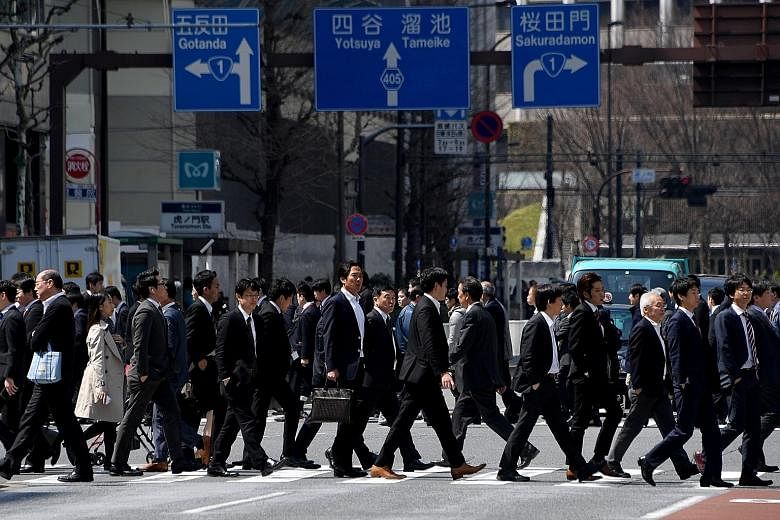After years of working in dead-end contract jobs, Ms Yasuyo Toyama, 39, finally managed to secure a full-time position recently as job prospects improve in Japan.
A tight labour market has also led to a greater appetite for job-hopping in a nation where company loyalty is traditionally prized.
The unemployment rate in February stood at a multi-year low of 2.8 per cent, and for every 100 job-seekers, there are 143 positions nationwide. The figure stands at 203 for Tokyo alone.
This is a bright spot for Japan's economy, which, as of last month, has chalked up 52 straight months of recovery in its third-longest streak since World War II. Japan has also registered larger growth per capita since 2012, when Prime Minister Shinzo Abe began his Abenomics economic policy, than in the preceding 15 years.
While its economy has turned a corner, Japan is not quite out of the woods as it struggles to snap out of a deflationary malaise that has caused sluggish productivity and low wage growth and inflation.
This has also resulted in consumers being reluctant to loosen their purse strings, even as surveys show more upbeat sentiment.
High demand for bilingual specialists in sectors such as fintech and retail, given a shortage of talent, has led to the tight labour market.
A spokesman for human resources consultancy Robert Walters Japan told The Straits Times: "The demand for skilled, bilingual professionals has continued to rise irrespective of industry or job title, making it challenging to attract talent."
But economists also note that many companies tend to plug their headcount with temporary workers, who do not qualify for bonuses or other benefits. They account for 40 per cent of the Japanese workforce, and earn less than two-thirds of their full-time colleagues.
This has led Mr Abe to pledge that "equal pay for equal work" will be a key prong of workplace reform laws that will be tabled in Parliament later this year.
Ms Toyama told The Straits Times of her frustrations in how her career in sales was "going nowhere" as a contract worker: "Companies that offer short-term contracts have much less of an incentive to train workers."
After working in a duty-free shop, she has since joined Singapore luxury-bag maker Kwanpen, which opens its first boutique in Tokyo next Thursday. Japan's heavy reliance on temporary workers and the reluctance of companies to invest in them is one reason for the country's perpetually low productivity, said Organisation for Economic Cooperation and Development (OECD) senior economist Randall Jones at a media briefing.
Mr Jones, who heads the Japan and South Korea desk at the OECD, said Japan urgently needs to kick-start a "virtuous cycle of profits, wage growth and inflation".
Slow wage growth, which inched up 0.5 per cent last year from 2015 in what was the fastest pace since 2010, has cast a pall over retail spending as households choose to err on the side of caution and save.
This is in spite of increasingly upbeat household confidence data, as was reflected in a Bank of Japan survey last week.
As of February, Japan has recorded 12 straight months of declining household expenditure, with consumers spending less on food, clothes, transport, communications and entertainment.
Average household spending in February fell 3.8 per cent to 260,644 yen (S$3,350) from a year ago, despite household incomes rising 0.7 per cent over the same period.
"The problem is wage-setting is backward-looking rather than forward-looking," Mr Jones said. "But inflation is likely to pick up, and we expect this to be factored into wages and as consumers see higher real wage growth, they will hopefully spend more."

